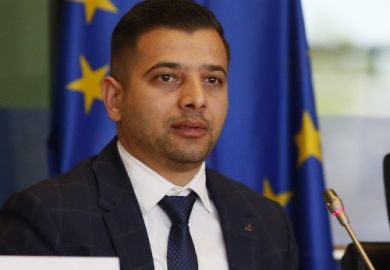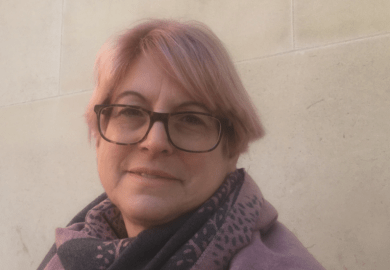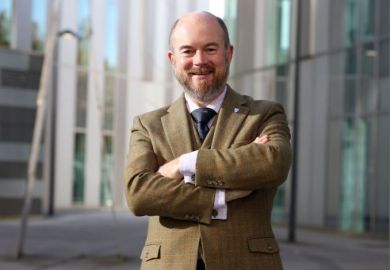Sonora Jha is professor in communication and media, and associate dean for academic community, at Seattle University. A former journalist in India and Singapore, she is the author of a memoir and two novels, most recently the campus novel, The Laughter, published in February. The New York Times described it as a “no-holds-barred comic achievement that lambastes the power structures” that keep men like its protagonist Oliver Harding, a “sex-obsessed” ageing English professor, “skulking the halls of academe”.
Where and when were you born?
In Secunderabad, India, in 1968.
How has this shaped who you are?
It would take a whole book and more to examine how India has shaped who I am. In one sentence – the place and year of my birth made me passionate, curious, hard-working, romantic and circumspect.
What’s different from other campus novels, or of the moment, about yours?
The Laughter takes the form and the most common narrator of the campus novel – the white, male professor – and subverts established tropes. As he examines those around him with dark humour, he is the one being satirised and dissected. I used him as a narrator to expose racial and sexual politics and the way women and people of colour in the academy – perhaps across the world – experience fetishising and othering. I wanted to present this story as an examination of power in and outside academia.
Is Oliver Harding based on a particular type of male academic? What made him the way he is?
Yes, he is absolutely based on a particular type of male academic that has been promoted, celebrated and even sheltered in academia. He has been canonised and given plum grants, chairs and tenure despite the egregious harm he has done to the trajectory, health and even sanity of others around him. Institutions of higher education move slowly and are often resistant to change even though they value themselves as liberal bastions where you pursue “the life of the mind”. Oliver Harding is the way he is because his power and his word went unchecked despite complaints against him, thanks to flawed Title IX processes [intended to prevent gender discrimination in educational institutions] and because things get covered up quickly by those in power. The book is also about the fattening and the rise of white male supremacy and radicalisation of the kind that led to the election of a certain US president and to white-collar men marauders at the US Capitol on 6 January 2021.
What kinds of reactions to the novel have you had from academic colleagues?
I have been blown away by the positive, even rave responses from my colleagues. Across gender, race and sexuality, colleagues have written to me to say they feel seen and heard in this book within and despite the context of the unreliable narrator that is Oliver Harding. My own university has been quite supportive. My colleagues turned out in great numbers for my book launch, including my dean. The university president plans to be at an upcoming book event. I’m hopeful academics see it as a satire as well as a tool for self-examination.
How and why did you make the switch from being a journalist in India and Singapore to an academic in the US?
The answer to this question is both personal and professional, and it formed an entire book, my memoir titled How to Raise a Feminist Son: Motherhood, Masculinity, and the Making of my Family (2021). In one sentence – I would not have left India had it not been for sexual harassment by a top editor at the newspaper I worked for, and I would not have moved to the US if it hadn’t been for a failing marriage, but I am fortunate to have made the best of these circumstances and gone back to school for a PhD here, and I now absolutely love my life as an author and academic in the US.
What makes you want to work across different kinds of writing and reach different audiences?
I start with a question and consider what might be the best way to answer that question. Journalism was the best way to enquire into social justice issues in India; academic research with qualitative and quantitative social scientific inquiry was the best way to answer the question about how journalists cover social movements (my dissertation and early scholarship looked at how American journalists covered the WTO protests, the anti-Vietnam war protests, 9/11, and presidential politics); fiction was the best way to represent the stories of farmer suicides in India (my first novel, Foreign); personal-political essays in a memoir was the best way to tell the story of a feminist life and feminist parenting, and now I feel devoted to exploring different voices in literary fiction. I also like to challenge myself and learn new forms, apart from taking risks and not conforming to what academia expects from “traditional” scholarship. I come from a rich tradition, in India, of public scholarship and public intellectualism, in which scholars don’t pigeonhole themselves into merely academic publishing but also remain in conversation with the public. I used to think this was a problem, but I have come to see that my lack of fear of failure allows me to innovate.
Is there a book that changed the way you think?
I find it impossible to name just one book but, yes, books and stories are what changed and shaped the way I think and saved my life. I grew up reading books by Indian and Pakistani writers such as Munshi Premchand, Manohar Malgonkar, Ismat Chugtai and Saadat Hasan Manto, and British writers like Enid Blyton and P. G. Wodehouse. They changed my perception of myself, in that I found I could imagine myself in a life different from my own.
When are you happiest?
What a delightful question! I am happiest when I have a whole day or several days to lose myself in reading and writing, with the promise of delicious food and the company of beloved people around the corner. I am also happiest when all this can happen on a beach. Does anyone want to offer me such a writing residency?
john.morgan@timeshighereducation.com
CV
1988 Bachelor of commerce, Narsee Monjee College, Bombay University
1995-97 Chief of metropolitan bureau, The Times of India, Bangalore
1997-2000 Freelance and contributing editor, East magazine, Singapore
2003 PhD in media and public affairs, Ken Uffman Fellow, Louisiana State University
2003-16 Assistant/associate professor/chair, communication department, Seattle University
2013 Foreign
2017- professor and associate dean, College of Arts and Sciences, Seattle University
2017 New Feminisms in South Asian Social Media, Film, and Literature, co-edited with Alka Kurian
2021 How to Raise a Feminist Son: Motherhood, Masculinity, and the Making of my Family
2023 The Laughter
Appointments
Orla Feely has been appointed the next president of University College Dublin and will take up the post in May. Currently vice-president for research, innovation and impact, the electronic engineer will succeed Mark Rogers, who has been acting president since March 2022. The chair of the university’s governing authority, Marie O’Connor, said Professor Feely was “an outstanding university leader with a distinguished academic track record in research and teaching”.
Eric Neumayer will become interim president and vice-chancellor at the London School of Economics in the summer, assisted by Charles Stafford who has been appointed his deputy. Professor Neumayer will hold the position while a replacement for Minouche Shafik, who is to become president of Columbia University, is recruited. A professor of environment and development who has been at LSE since 1998, Professor Neumayer said there was “no greater honour than to serve the school in this role”.
Mike Shipman will be Durham University’s new deputy vice-chancellor and provost. He is currently vice-president and pro vice-chancellor (international) at the University of Warwick.
Rachel O’Reilly has been appointed the University of Birmingham’s new pro vice-chancellor (research). She moves from her current role as head of the School of Chemistry.
Mark Harris has been named the University of Adelaide’s next head of the School of Humanities. He is currently professor of historical anthropology at the University of St Andrews.
Antonius Raghubansie is heading to Keele University as its first pro vice-chancellor for international. He joins in May from the British Council, where he has worked in South and East Asia.
Josep Franch has been appointed the new director of executive education at Esade. A former dean of Esade Business School, he is currently associate professor in the marketing department.
Register to continue
Why register?
- Registration is free and only takes a moment
- Once registered, you can read 3 articles a month
- Sign up for our newsletter
Subscribe
Or subscribe for unlimited access to:
- Unlimited access to news, views, insights & reviews
- Digital editions
- Digital access to THE’s university and college rankings analysis
Already registered or a current subscriber?











